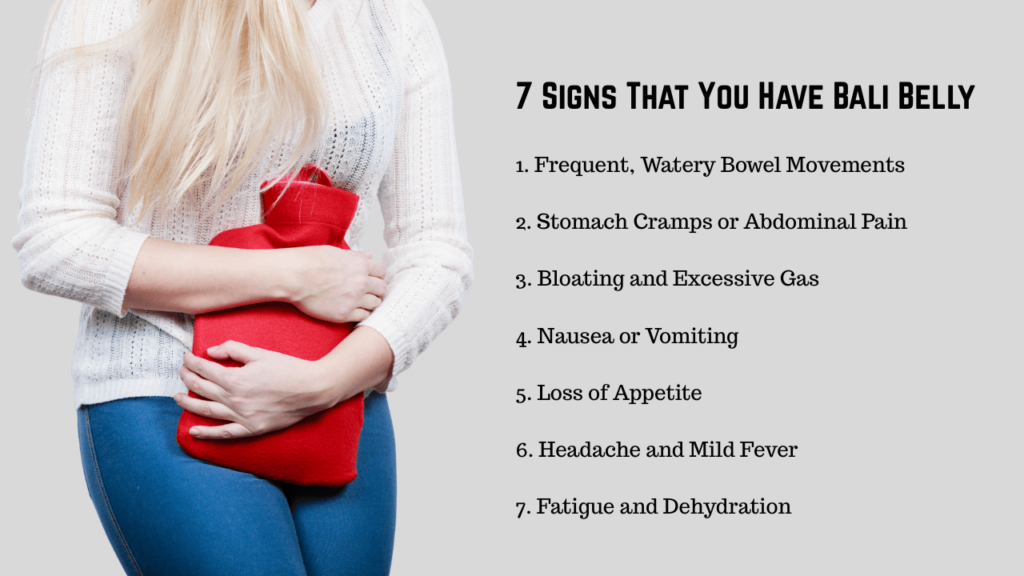
If you’re traveling in Bali and suddenly experience stomach cramps, nausea, or diarrhea, you might be suffering from what’s commonly known as Bali Belly — a form of traveler’s diarrhea caused by bacteria or contaminated food and water. While it’s a common condition among visitors, it can quickly ruin your vacation if not treated properly. The good news is that with the right care, recovery can be fast and comfortable. This guide will explain everything you need to know about Bali Belly Treatment, from symptoms and remedies to professional medical options available on the island — including Saline Bali’s 45-minute IV hydration therapy, designed to help you recover quickly and safely wherever you are in Bali.
What Is Bali Belly (Travel Diarrhea)?
“Bali Belly” is a term often used to describe traveler’s diarrhea, a digestive illness commonly experienced by visitors in Bali. It usually occurs after consuming contaminated food or water, which can carry harmful bacteria such as E. coli or Salmonella. This condition doesn’t only affect tourists; even locals can experience it when their immune system is weakened or when hygiene standards fluctuate. The hot and humid tropical climate can also contribute to faster bacterial growth in food, increasing the risk of infection.
Typical symptoms of Bali Belly include stomach cramps, nausea, diarrhea, bloating, and fatigue, which can range from mild to quite severe. Although most cases clear up naturally within a few days, proper treatment and hydration are crucial to avoid complications like dehydration or nutrient loss. Without adequate care, symptoms may linger and disrupt your travel plans. Recognizing the signs early and taking prompt action — such as resting, staying hydrated, and seeking medical help when necessary — can make recovery much faster and more comfortable.
7 Signs That You Have Bali Belly

You might be suffering from Bali Belly if you experience one or more of the following:
1. Frequent, Watery Bowel Movements
One of the most common and noticeable signs of Bali Belly is frequent, watery bowel movements. This happens because your digestive system is trying to flush out the harmful bacteria or toxins causing the infection. While this is a natural response, it can quickly lead to fluid loss and dehydration, especially in Bali’s hot climate. It’s essential to replace lost fluids with water or electrolyte drinks to keep your body hydrated and balanced during recovery.
2. Stomach Cramps or Abdominal Pain
Stomach cramps or abdominal pain often accompany Bali Belly as your intestines become irritated or inflamed by the infection. These cramps can vary from mild discomfort to sharp, persistent pain that disrupts daily activities. Resting and avoiding greasy or spicy foods can help soothe your stomach, while warm compresses or herbal teas such as ginger or peppermint may also provide gentle relief.
3. Bloating and Excessive Gas
Bloating and gas are caused by an overproduction of air in the digestive tract as your gut bacteria react to the infection. You might feel tightness or pressure in your abdomen, which can be uncomfortable and even painful. To reduce bloating, avoid carbonated drinks, dairy products, and foods that are difficult to digest. Staying hydrated and walking lightly can help your body release trapped gas naturally.
4. Nausea or Vomiting
Nausea and vomiting are common when the stomach lining becomes irritated by harmful bacteria or toxins. This can make it difficult to keep food or fluids down, which increases the risk of dehydration. If you feel nauseous, sip water or herbal tea slowly rather than drinking large amounts at once. Avoid solid food until the nausea subsides, then start with bland meals such as rice, bananas, or toast to ease digestion.
5. Loss of Appetite
When your body is fighting infection, it often suppresses appetite as a defense mechanism. You may not feel hungry or might even feel repelled by the smell of food. Although it’s important to listen to your body, try to eat small, gentle meals once you can tolerate food again. Nutritious, easy-to-digest options like soups, rice porridge, or plain toast can help replenish your energy without straining your stomach.
6. Headache and Mild Fever
A mild fever and headache are signs that your immune system is actively fighting the infection. While low-grade fevers are generally harmless, they can cause discomfort and weakness. Staying in a cool, comfortable environment and keeping hydrated can help regulate your temperature. Over-the-counter pain relievers may help, but consult a doctor before taking any medication if symptoms persist.
7. Fatigue and Dehydration
Fatigue often occurs as your body expends extra energy battling the infection while losing fluids through diarrhea and vomiting. Dehydration can worsen this exhaustion, leading to dizziness, dry mouth, or dark urine. To recover, focus on rehydration — water, electrolyte drinks, or IV therapy can help restore lost fluids more effectively. Adequate rest and gentle nutrition will help your body regain strength and recover fully.
If your symptoms last longer than three days, become more intense, or include severe dehydration, it’s time to seek professional medical treatment. Clinics like Saline Bali offer specialized Bali Belly Treatment, including at-home IV hydration therapy that quickly restores fluids, electrolytes, and energy. Prompt care not only speeds up recovery but also ensures your condition doesn’t worsen during your stay in Bali.
What to Do When You Get Bali Belly

When you suspect you’ve got Bali Belly, take immediate steps to restore hydration and comfort. Here are some recommended actions:
Drink Warm Tea or Ginger Tea
Sipping on warm tea or ginger tea is one of the simplest and most effective ways to calm your stomach when dealing with Bali Belly. Ginger contains natural anti-inflammatory and anti-nausea properties that help relax the digestive muscles, reduce stomach cramps, and ease nausea. Warm liquids, in general, also promote better digestion and comfort, especially when your stomach feels unsettled. Avoid caffeinated or sugary teas, as they can irritate your digestive tract — instead, opt for mild herbal options like chamomile, peppermint, or ginger for soothing relief.
Stay Hydrated
Hydration is the most critical part of recovery from Bali Belly. Frequent diarrhea and vomiting cause your body to lose large amounts of fluids and electrolytes, leading to dehydration, weakness, and dizziness. To replace these losses, drink plenty of water, coconut water, or oral rehydration solutions (ORS), which contain essential salts and minerals. Take small, frequent sips rather than large gulps to prevent further nausea. If you find it difficult to keep fluids down, professional IV hydration therapy can help restore balance more efficiently.
Eat Soft, Plain Food
When your stomach begins to settle, gradually reintroduce food with soft, bland meals. The best options include rice, bananas, toast, oatmeal, or clear soup — foods that are gentle on your digestive system and easy to absorb. Avoid spicy, oily, or dairy-heavy meals, as they can trigger further irritation or diarrhea. Eating small portions several times a day helps your gut heal while keeping your energy levels stable. Listening to your body and eating only what feels comfortable is key to a smooth recovery.
IV Drip Therapy
For a faster and more complete recovery, especially if you’re too weak to eat or drink, IV drip therapy can be extremely effective. This treatment delivers fluids, electrolytes, and vitamins directly into your bloodstream, allowing for quick rehydration and nutrient absorption. Clinics like Saline Bali offer convenient 45-minute IV drip treatments that can be done at your villa or hotel. This option is ideal for travelers who need rapid relief from dehydration, fatigue, or nausea — helping you regain strength and feel better within hours.
Take Antibiotics (Only Under Medical Advice)
In some cases, antibiotics may be necessary if your Bali Belly is caused by a bacterial infection such as E. coli or Salmonella. However, these should only be taken under a doctor’s prescription, as misuse can lead to antibiotic resistance or worsen symptoms.. Avoid self-medicating, and always complete the full course if prescribed to ensure complete recovery and prevent recurrence.
When to See a Doctor

You should seek professional medical help if:
- Your diarrhea lasts more than 2–3 days
- You experience severe stomach pain or high fever
- You’re unable to keep any fluids down
- You notice blood in your stool or signs of severe dehydration
In these cases, Saline Bali Clinic provides reliable and comfortable Bali Belly Treatment services — including at-home care for tourists and locals.
Where to Get Bali Belly Treatment in Bali
If you’re in Bali and suffering from travel diarrhea, Saline Bali offers professional medical assistance right at your villa or hotel. Their medical team specializes in IV hydration therapy, anti-nausea treatment, and antibiotic administration when needed.
The Bali Belly Treatment by Saline Bali takes approximately 45 minutes, ensuring a fast and effective recovery without the need to visit a hospital. This is ideal for travelers who want to regain strength quickly and safely.
What Labs in Bali Can Test for Bali Belly

For an accurate diagnosis of Bali Belly, medical testing is often necessary to identify the exact cause of your symptoms. While many mild cases resolve on their own, persistent or severe symptoms may indicate a bacterial, viral, or parasitic infection that requires specific treatment. Stool and blood tests are the most reliable ways to determine what’s causing the illness, helping doctors distinguish between foodborne bacteria like E. coli or Salmonella, parasitic infections such as Giardia, or viral gastroenteritis.
To make this process convenient for travelers, Saline Bali partners with certified laboratories across Bali to offer on-demand testing services directly from your villa or accommodation. Once the results are available, the medical team can provide targeted treatment, including antibiotics, hydration therapy, or other supportive care, ensuring you receive safe, effective, and personalized medical attention without the need for hospital visits.
Flying with Bali Belly: What You Should Know
If you need to fly while experiencing Bali Belly, take extra precautions. Dehydration can worsen during flights, so it’s best to get IV hydration treatment before boarding. Saline Bali Clinic offers a quick, 45-minute IV drip therapy that rehydrates your body, reduces nausea, and prepares you for travel.
This service is perfect for those who experience last-minute symptoms before flying, helping you feel well enough to endure the journey safely and comfortably.
Why Choose Saline Bali for Bali Belly Treatment

- At-home service available across Bali
- Fast recovery with 45-minute IV therapy
- Certified medical professionals
- Safe, hygienic procedures using hospital-grade equipment
- 7 days/week assistance for tourists and locals
Bali Belly can be unpleasant, but with proper care, rest, and hydration, recovery is quick and manageable. For those seeking a trusted Bali Belly Treatment, Saline Bali Clinic offers a convenient and professional solution — helping you recover safely, whether you’re relaxing in your villa or preparing for your next flight.
Frequently Asked Questions
What is Bali Belly?
Bali Belly is a common term used to describe gastrointestinal symptoms such as diarrhea, stomach cramps, and nausea that travelers may experience while visiting Bali or other parts of Indonesia.
What causes Bali Belly?
Bali Belly is often caused by ingesting contaminated food or water. Bacteria, viruses, or parasites in food and water can cause the infection.
What are the common symptoms of Bali Belly?
The symptoms of Bali Belly include diarrhea, stomach cramps, nausea, vomiting, fever, and dehydration.
How can Bali Belly be treated?
Bali Belly can be treated with medication to relieve symptoms and prevent dehydration. Antibiotics may be prescribed for severe cases.
How long does Bali Belly last?
Bali Belly usually lasts between 24-48 hours, but it can take up to a week for the symptoms to completely disappear.
How can I prevent Bali Belly?
You can prevent Bali Belly by practicing good hygiene, such as washing your hands regularly, avoiding street food, and only drinking bottled or filtered water.
Should I see a doctor if I have Bali Belly?
If you have severe symptoms or if your symptoms persist for more than a few days, it is recommended that you seek medical attention.
Can Bali Belly be contagious?
Bali Belly is not usually contagious, but the infection can be spread through contact with contaminated food or water.
Can I still enjoy my Bali vacation if I get Bali Belly?
Bali Belly is a common ailment among travelers to Indonesia, but it should not ruin your vacation. With proper treatment and hydration, most people recover quickly.
Is Bali Belly a serious condition?
In most cases, Bali Belly is not a serious condition and can be treated easily. However, severe cases can lead to dehydration and may require medical attention.




